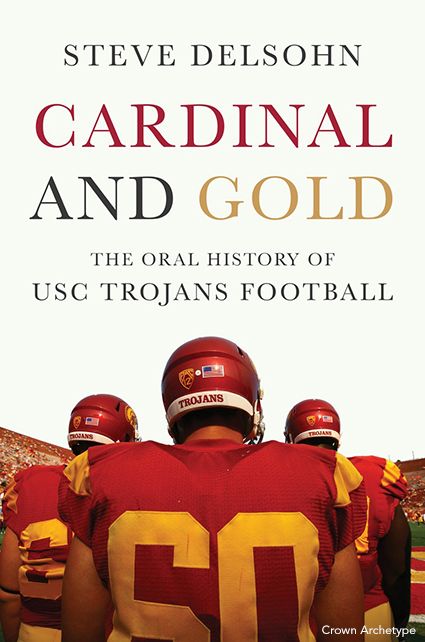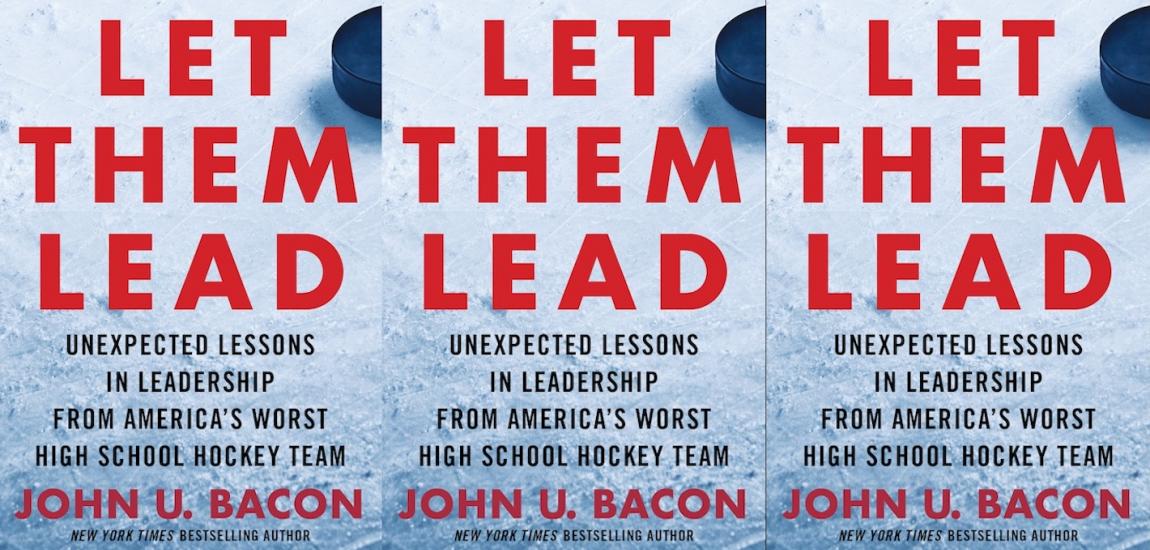Over the years, USC has been surrounded by controversy, even as it won 11 national titles and produced six Heisman winners and numerous future NFL stars. Cardinal And Gold: The Oral History Of USC Trojans Football by Steve Delsohn tells the story of the program at its best and worst, with a special focus on the past 40 years. Here is an excerpt from that chapter focusing on the Trojans' attempt to win a third consecutive national title in 2005 -- without Norm Chow as offensive coordinator.
On January 15, 2005, eleven days after winning the MVP at the Orange Bowl, Matt Leinart announced that he would return for his senior season rather than enter that spring's NFL draft. Projected to be a top ten pick, he was perceived as a young man forsaking instant wealth for the chance to spend more time in cardinal and gold.
"I went with my heart. I went with my gut," Leinart told the crowd packed into the lobby at Heritage Hall. "I think college football and this whole atmosphere here and being with my friends and my teammates is ultimately more satisfying and will make me happier than any amount of money could make someone happy."
Carroll said after hugging Leinart, "This is a wonderful statement about college football. For those guys, really, this is the time of their lives.
BEN MALCOLMSON: That was huge. That was earth-shattering. This was a Heisman Trophy winner whose record as a starter was 25–1.
BRANDON HANCOCK: I don't know how seriously he considered leaving. I know he tested the water. He was obviously a guy who could have been drafted high. But I think he looked at the grand scheme of things and he thought, What's the rush to get out of here? It's always a lot harder to walk away from something when it's going so damn good. We were going for a three-peat, trying to rewrite the history books.
PETROS PAPADAKIS: Leinart was hurt! That whole Leinart thing, where he said he wants to stay and he loves SC and what a great place and they did that whole press conference and he was humping Carroll, basically? A week later he had elbow surgery and hernia surgery. How was he gonna work out for anybody in the NFL? He wasn't gonna be able to go through the draft process. He had to stay. So that was all orchestrated. Leinart stayed because he had two surgeries -- not one -- to recover from. Then he didn't play that entire spring. So that whole press conference was a facade. I was too close to the program at that point, and I took it very personally. They made a real drama out of it.
Garry Paskwietz is a USC graduate and the publisher of the WeAreSC website. He's covered the football program since 1996.
GARRY PASKWIETZ: Part of his desire to return was the chance to accomplish some rare air in college football: three national titles, two Heismans, the winning streak. There were also some arm issues that may not have allowed him to work out for NFL teams at full strength during the draft process that contributed to his decision to stay. Of course, he made the decision to stay before Pete Carroll told him that Norm Chow wouldn't be coming back as the play caller. Leinart and Chow had a uniquely good relationship, as evidenced by the results they achieved on the field.
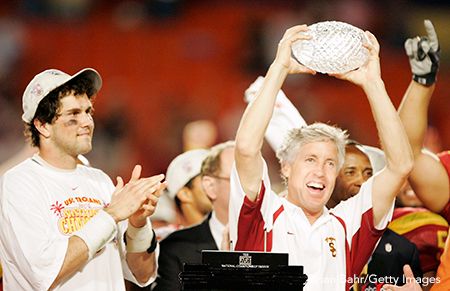
LENDALE WHITE: Losing Chow, for Matt, was like losing the guy who got you the Heisman. You know what I mean? He's the quarterback guru.
The news of Chow's departure came in February 2005, just two months after the news that Ed Orgeron was leaving to become head coach at Mississippi. Before Chow left USC, he had interviewed that January for the top job at Stanford. But rather than making Chow college football's first Asian American head coach, the Cardinal chose an angry white guy named Walt Harris. He went 5–6 and 1–11 before Stanford fired him.
Later in January 2005, Carroll, Lane Kiffin, and Steve Sarkisian held their now-famous meeting at the Senior Bowl in Alabama. Sarkisian had been the USC quarterbacks coach from 2001 to 2003 before spending 2004 in the same job for the Oakland Raiders. Kiffin had started at USC in 2001 as the tight ends coach and then coached the wide receivers the next two seasons. In 2004, Carrol promoted Kiffin to passing game coordinator.
At the Senior Bowl meeting, Carroll, Kiffin, and Sarkisian reportedly discussed the idea of keeping Chow on the staff as assistant head coach but taking away his play-calling responsibilities. Instead the USC offense would be run jointly by the 30-year-old Kiffin and the 31-year-old Sarkisian, who Carroll planned to rehire away from the Raiders. When Chow learned of the plan for the upcoming season, he left the USC program for his first NFL job as the offensive coordinator for the Tennessee Titans.
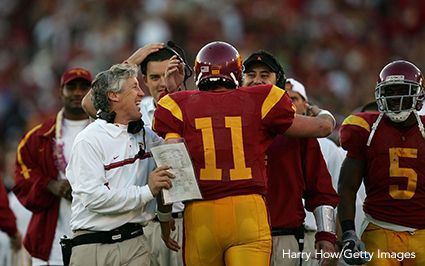
The Trojans had recently scored 55 points in the Orange Bowl, for their 22nd straight win and second consecutive national championship. Leinart had joined Palmer as a Heisman Trophy winner, and both had been unproven before being tutored by Chow. Thus the news of his exit created national headlines and rekindled the rumors about a rift with Carroll.
LENDALE WHITE: It was a whole bunch of tension between a lot of them coaches. Kiffin and Chow, Sark and Chow, Pete and Chow, but Chow is a certain individual, man, and he stands up for what he believes in. I don't know if it was a gang-up thing. That would be speculation for sure.
We were a little bit shocked when we heard, but being on that team, you knew certain in-house things were going to happen. You heard certain ripples. And we all kind of understood that it was two alpha males in the same room, in a sense, so somebody had to go before it turned into a big blowup. I think Norm Chow did the best thing he could do, and that was just move on. But I do believe that Norm still wanted to be there with us.
GARRY PASKWIETZ: It was not Chow's choice to leave. Pete was looking to take away his play-calling duties in order to turn them over to Sarkisian/Kiffin. Norm wanted to call plays, he realized it wasn't going to happen at USC, so he left and went to the Titans. It was never his desire to coach in the NFL. He had been a college coach all his life and loved coaching young men in that age range to help develop them.
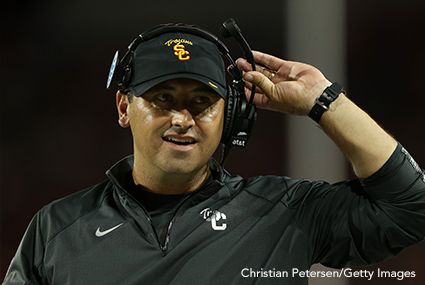
BRANDON HANCOCK: I wasn't upstairs in those meetings. But there were whispers of a power struggle or an ego struggle. When there was a lot of praise in the media, a lot of that praise was directed at Chow. Maybe that started problems. Who was getting credit for what?
It may have been partly stylistic. If you look at how they operate, they're night and day. Norm Chow is a stoic, soft-spoken older dude who's not really hip to the things that make young people tick. Coach Carroll is a fiery guy who listens to rap music and knows who the hottest actors and musicians are. There was definitely some friction. I'm not sure why. But like any business, especially when you're surrounded by a bunch of men hopped up on testosterone, there's going to be egos and they are going to clash.
CHRIS HUSTON: There's a psychological thing with Carroll. He hadn't been all that successful in the NFL, and there were all these things he wanted to try. But when he got to USC, he couldn't try all those ideas because he first and foremost had to win or else he might be fired. This was probably his final chance.
So he brought in this excellent staff. Norm Chow won a national title at BYU and had been a hugely successful offensive coach. They had Ed Orgeron. They went through this process together, and they won all these games. Then I think Carroll was like: Now I have the power to do everything my way. That meant Norm Chow had to go, because Carroll wanted to have his handpicked guys running the offense: Kiffin and Sarkisian.
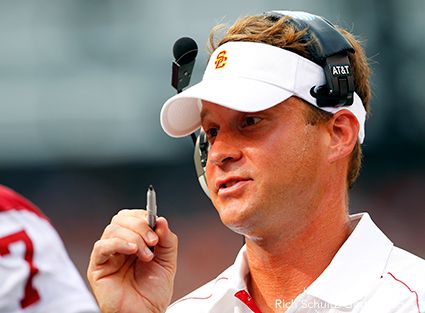
PETROS PAPADAKIS: USC has always had head coaches who people adored, like John McKay or John Robinson, who were in their own way charismatic people. Pete is charismatic in his way. But many great assistants in football history also came from USC -- from Norv Turner, to Marv Goux, to Dave Levy, to Hudson Houck, to Joe Gibbs.
The great assistants on those first Carroll staffs were Kennedy Pola, Norm Chow, Tim Davis, Ed Orgeron. They were also adult voices, alongside Carroll, that pushed his message. Now, with success, you will lose assistant coaches. But it's the way that Pete lost them and how they felt after they left and who replaced them that really tells the story. I really think Pete wanted to be the only adult voice out there. So he pumped up these two young guys: Sarkisian and Kiffin.
But USC never won a championship without Norm Chow calling the plays. And the second Pete tried to say, "Hey, Lane's gonna call plays," Norm Chow left. They had gone undefeated the previous season. But you could see the vein in Carroll's head pop out when he was asked about Norm Chow's offense at halftime of the Oklahoma championship game. He was pissed. He didn't like that. And so after that season, he told Norm he would not be calling the plays. It was because he wanted Norm out.
And then, Lane is Lane. He's an abrasive guy who rubbed a lot of people the wrong way. Carroll set up this thing where he pitted Lane against Chow so he could get Chow out of there. As for Sarkisian, he played quarterback for Chow at BYU. Then Sarkisian was coaching f------ high school baseball at his alma mater. Then Carroll paid Norm all that money to come to USC, and Norm went and dug Sark out. But Sark later let Pete push Norm right out of the program, and Sark really sold his soul during that moment. Chow was the guy who started his coaching career. But Sark let Carroll throw him under the bus. Then Sark ended up with a head-coaching job at Washington and then the head job at USC. Sark got opportunities because of staying close to Carroll, and so has Lane.
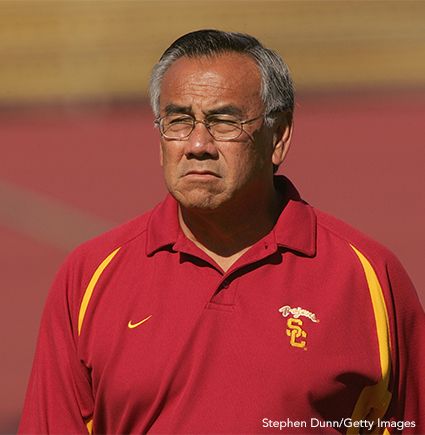
SHELLEY SMITH: Pete was handing more of the play calling to Lane, and by that point Lane and Norm didn't get along. Norm was also getting a lot of attention, and Pete might have been jealous of that, but I don't know. I think it was out of respect for Monte Kiffin as well. Everybody knows Monte and Pete were close. I think out of respect to Monte, he wanted to give Lane a break.
CHRIS HUSTON: Lane Kiffin is basically Pete Carroll's godson. Monte Kiffin is Pete Carroll's mentor. Not only his personal mentor but also his football mentor. Monte Kiffin's defense is Pete Carroll's defense. That Monte Kiffin-Pete Carroll relationship is very important because it paved the way for Lane Kiffin at USC. Pete really wanted Monte to get an NFL head- coaching job for a long time, and he did his best to help. But Monte couldn't get one, and he had always done so much for Pete Carroll. So Pete wanted to do as much for Lane as possible.
By the way, everybody loved Monte Kiffin. He was a character. He was one of those guys who'd hang out in a coffee shop until two a.m. and talk football. Lane is more like Paul Hackett. Lane would rather watch film and wants nothing to do with people.
I asked Chow about his relationship with Lane Kiffin.
NORM CHOW: The same as he probably had with the other coaches. How do you put it nicely? He was a good fellow. He was a young guy who everyone knew was Pete's guy because of Lane's dad, and he was able to do a lot of things real early in his career that most people don't get a chance to do. And Lane is fine. He's a good guy. But he struggled obviously with some relationships with the other coaches because everybody knew he was Pete's little guy.
Here's what really happened. When I took the job at USC, Pete didn't have a lot of ties in college. He told me, "I'll let you hire who you want to hire as far as your staff is concerned." And I didn't really feel real strongly about, We should hire this guy or that guy. But then at the end, when we needed a tight ends coach, Pete said, "Do me a favor. Just interview this guy. We don't need to hire him." He was Monte's son, and Monte is Pete's guy that he looks up to. Pete said, "Just interview him to help his career along." Lane was a quality control coach at Tampa Bay, and an interview from USC would be a good deal. We had no intention of hiring him. Pete didn't seem to anyway, and I didn't know the guy. So we brought him out. And as it wore on, Pete said, "Why don't we just bring him on because we really don't have anybody else that we feel strongly about."
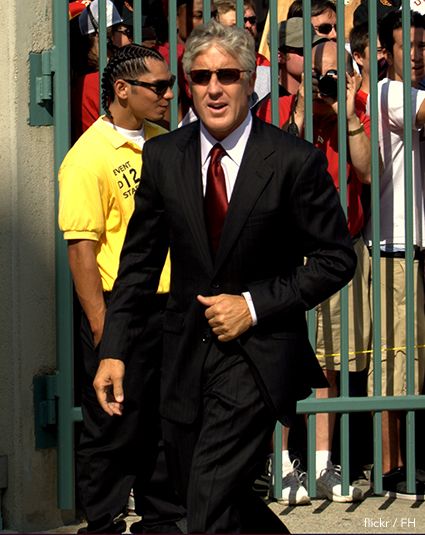
So we did. Pete obviously gave him the break of a lifetime, and then he's been in situations where he probably didn't belong. We all know that. Everybody in the country knows that.
I asked Chow specifically about his 2005 departure from USC.
NORM CHOW: Sark, Kiffin, and Pete met at the Senior Bowl. And like I said earlier, Pete loves to tinker, and I guess it was not good enough what we had done. He wanted to give those guys a little bit more responsibility. Those are his guys, he wanted to take care of them, and I'm sure they were clamoring for more responsibility as well. I don't know if you've noticed Pete's career, but he really encourages guys to move up and better themselves. I think he looks at it as a feather in his cap that his guys are moving up. And then at that point in time, the NFL came calling.
I always wanted to give the NFL maybe a shot. I didn't sit around aspiring to the NFL, but a couple teams called after that season. And understanding what Pete was trying to get done with Sarkisian and Kiffin, I had a chance to make some money and set my family up for retirement for the rest of our lives. USC is top shelf, but it was time to move on professionally.
I asked Chow if he felt pushed out at all.
NORM CHOW: A little bit. A little bit. But I mean, when you say "pushed out," you double your wages, you get a shot to be a coordinator in the NFL. Not a position coach, a coordinator. There's only 32 of those guys.
A lot of people say that -- "you got pushed out" -- but in my mind and in my family's mind, Pete forced us to -- not forced us, but what's the right word? Pete encouraged us to be financially solid. So I coached three years in the NFL, got paid, and got fired. I set my family up for our retirement. So I thank Pete for that. And I loved the time I had at USC. I have two children who graduated from there. I loved the people there. The school is terrific. And so, yes, it was very difficult to leave. It was very, very difficult because of the relationships that were made.
-- Excerpted by permission from Cardinal And Gold: The Oral History Of USC Trojans Football by Steve Delsohn. Copyright (c) 2016. Published by Crown Archetype, an imprint of Penguin Random House LLC.. All rights reserved. No part of this excerpt may be reproduced or reprinted without permission in writing from the publisher. Available for purchase from the publisher, Amazon, Barnes & Noble and iTunes. Follow Steve Delsohn on Twitter @sdelsohnespn.


